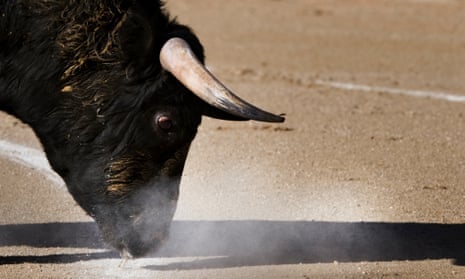In the small Spanish town of Villafranca de los Caballeros, bulls are taking a back seat to books.
For more than a decade, the small town 80 miles south of Madrid has celebrated its local fiesta with a bullfight. But the tradition could end this year, after the council said it would direct its annual subsidy for the bullfight towards books and school supplies for the town’s students.
“It’s a question of priorities,” said the town’s newly elected socialist mayor, Julián Bolaños. “There is a lot of unemployment in this town and many people simply don’t have money to buy school supplies for their children.”
The town council will vote on the motion on Thursday. It was expected to pass easily, said Bolaños, whose socialists hold a majority.
While he dislikes bullfights – describing them as a “cruel spectacle” – he stressed that the decision wasn’t based on personal opinion. “We’re not against bullfights. But it’s money that we can use in other ways,” he said. He estimated that the town, which has a population of 5,200, was spending as much as €18,000 a year to hold the annual event.
He was doubtful that the bullfight, usually held in September, would be able to go ahead without the town’s funding. “But if any company is interested and wants to assume the cost, they can go ahead.”
So far he had only received positive responses to the decision. “Even people who love bullfights have called me to say that they agree with us. They tell me they can go to other places to see bullfights but that these families don’t have other options available to them.”
After May’s municipal elections sent an injection of socialists and leftists into councils across the country, Villafranca de los Caballeros is one of a dozen municipalities across Spain that has begun questioning whether public funds should be used for bullfights or bull runs.
In Madrid, the mayor, Manuela Carmena, has vowed that “not one euro of public money” would go towards funding bullfights, while the mayor of A Coruña, Xulio Ferreiro, announced the city would seek to cancel a planned bullfighting festival in August by revoking its permit to use municipal land. Both Carmena and Ferreiro front citizen platforms whose roots lie in the indignado movement.
The new government of Alicante said it plans to do away with subsidies destined for bullfighting and ban municipal land from being used in bullfights by 2017, while in nearby Alzira, the new leftist council began its term in council by ending the bull run introduced by the conservative People’s party seven years earlier.
Animal rights activists in Spain have welcomed their actions but point out that more needs to be done, with more than 16,000 fiestas involving bulls being planned this year in some 3,000 municipalities across the country.
In a nod to the polarised sentiment among Spaniards on fiestas involving bulls, Valencian cities including Dénia, Aldaia, and Sueca have said they want to hold referendums to poll their citizens on the matter.
Others have taken aim. In Valencia, People’s party politician Luis Santamaría vowed to take legal action against local councils. “You have to keep in mind that fiestas involving bulls are part of our identity and have been declared a key part of the country’s cultural heritage,” he said.
